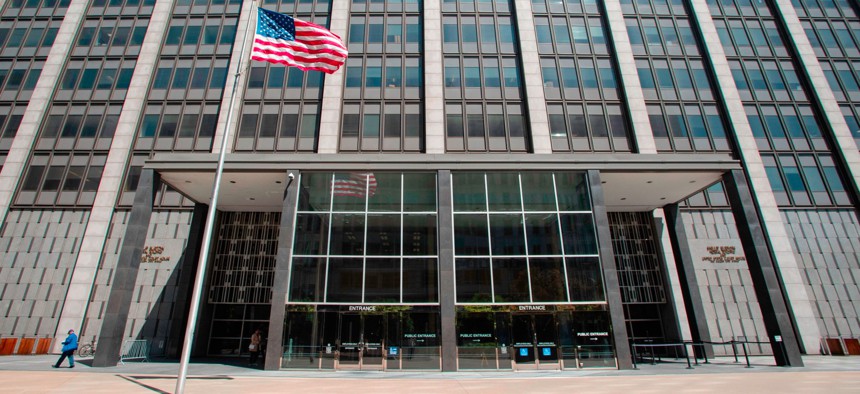
Judge William Alsup said that the original justification for firing probationary employees was a "total sham." JOSH EDELSON / GETTY IMAGES
As re-firings begin, judge demands Trump administration tell probationary employees they were not let go for poor performance
Court declines to block more firings of recently hired staff, saying individual agencies are now making their own decisions.
Updated April 22 at 12:19 a.m.
Federal agencies must inform thousands of employees fired during their probationary periods that they were not let go as a result of their performance, a judge has ruled, though he will allow the dismissals to once again take place.
The original decision that led to the reinstatement of 16,000 employees at six departments, issued by Judge William Alsup for the U.S. District of Northern California, has been paused by the Supreme Court. Alsup issued a more refined order on Friday after newly finding that federal employee unions representing the plaintiffs in the case have standing to sue the Trump administration over the firings.
Alsup did not call for firings to once again be halted as any future terminations would be carried out by individual agencies. His initial finding was rooted in the Office of Personnel Management unlawfully directing agencies to take the firing action. Since the employees have been re-hired and OPM has ostensibly directed agencies to make their own decisions regarding those workers, the judge said, any re-firings going forward would occur at the discretion of each agency.
Still, Alsup made clear the original firings were illegal and the stated reason for the dismissals—that employees had performed poorly or were not a fit for federal service—was “a total sham.”
“Countless high-performing employees, including those highlighted above, were terminated through a lie,” Alsup said, highlighting some examples put forward by attorneys for the American Federation of Government Employees.
At least some agencies have begun re-firing their probationary employees. In a submission to the court, attorneys for plaintiffs noted that National Oceanic and Atmospheric Administration probationary staff have received notices they have been terminated once again and the firing is retroactive to February.
A Commerce Department official confirmed NOAA and all Commerce agencies had re-fired its employees retroactively, amounting to about 725 individuals.
The plaintiffs’ attorneys suggested this meant the department had not carefully reconsidered the firings on a case-by-case basis but was instead still leaning on OPM’s original directive.
At other agencies, meanwhile, previously fired probationary employees are being deemed too critical to let go. At both the Agriculture Department and the Internal Revenue Service, some employees fired and subsequently re-hired under court order have been rejected from participating in the "deferred resignation program" that will enable some federal workers to take paid leave until they separate from federal service Sept. 30.
"Upon review,' your position has been deemed critical and therefore you are ineligible" for the program, read a notice to a fired and rehired probationer reviewed by Government Executive. One IRS employee said the probationers returned to their office on Monday, only for their manager to say he was instructed not to assign them any work.
Probationary employees suffered another setback on Monday when the Office of Special Counsel opted to drop the cases of thousands of employees who pursued appeals through the independent watchdog agency. As first reported by Government Executive, OSC previously ruled the firings were likely unlawful. President Trump subsequently fired the head of OSC, Hampton Dellinger, and the agency is now led on an acting basis by the U.S. Trade Representative Jamieson Greer. OSC told employees it did not have jurisdiction over their cases because their firings were part of a large-scale effort to reduce the size of the federal workforce.
Rob Shriver, former head of the Office of Personnel Management and a managing director at Democracy Forward, said Greer has in essence told federal employees "they have no protection."
"The OSC was created by Congress to serve as a safeguard for federal workers against unlawful personnel practices," Shriver said. "Today’s announcement makes clear that under Acting Special Counsel Jamieson Greer, that safeguard is over."
Alsup's mandate to notify employees they were not fired for performance will at least help reduce the harm caused by the original, unlawful terminations, the judge said. He enjoined OPM from directing more firings.
“Termination under the false pretense of performance is an injury that will persist for the working life of each civil servant,” the judge said. “In pursuing future employment, each will have to concede that they have been terminated based on performance. The stain created by OPM’s pretense will follow each employee through their careers and will limit their professional opportunities.”
It may also open up new opportunities for re-fired employees to challenge their dismissals: under federal statute, probationary period employees can only be terminated for performance or conduct.
The Supreme Court earlier this month struck down Alsup’s broader injunction after finding the non-profit groups that helped bring the lawsuit likely did not have standing in the case. AFGE then sought to establish its own standing in the case, which Alsup granted.
More fired probationary employees were re-hired under a ruling by a federal judge in Maryland, but an appeals court has since issued a stay on that injunction.
This story was updated to include details of OSC's new findings.
How are these changes affecting you? Share your experience with us:
Eric Katz: ekatz@govexec.com, Signal: erickatz.28
NEXT STORY: OPM proposes rule to formally revive Schedule F







